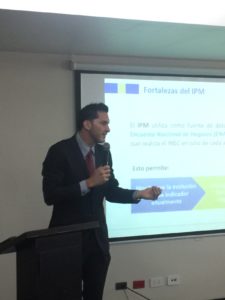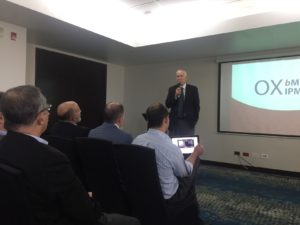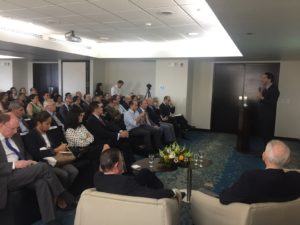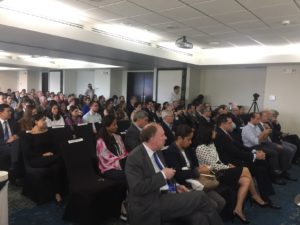
Search
Posts con la etiqueta ‘Business MPI’
Incorporating gender into the Business Multidimensional Poverty Index: The Wise Responder initiative
Oxford University launches social enterprise to help business fight poverty
sOPHIa’s goal is to provide businesses with tools to measure and respond to poverty amongst their employees and their families, contractors, and in their supply chain. In addition, sOPHIa plans to offer companies the ability to be audited to verify that they have met standards in implementing the bMPI and programs to impact the poverty of employees. Companies meeting the standards will receive a seal to demonstrate their commitment to ending poverty.
Since 2014, OPHI had partnered with Horizonte Positivo to help the Costa Rican Government develop its National MPI, with the bMPI following in 2017 with a launch in Costa Rica. The bMPI initiative began when the Chairman of BAC Credomatic Bank, Costa Rica, Ernesto Castegnaro, asked at a meeting of the Horizonte Positivo Board, if there might be any multidimensional poverty in his bank and an initial survey revealed more employee household poverty than expected. The same result was received in two other pilot companies, Purdy Motors, Costa Rica’s Toyota dealer and the public relations agency CCK Central America. Horizonte Positivo then tested and applied the bMPI in the private sector. Horizonte Positivo now provides assistance to 39 companies involved across business sectors of Costa Rica.
sOPHIa is currently being funded from individuals in the UK and USA and in Costa Rica to date the bMPI is funded by fees from companies. The Costa Rica program expects to work with 100 companies in 2019.
Federico Odio, Country Manager BAC Credomatic Costa Rica, said:
“We are particularly proud of our initiatives to eradicate poverty within our staff and reduce it significantly in our country. BAC Credomatic was the first bank in the world to apply Oxford’s Multidimensional Poverty Index with its staff, identifying that 12 percent of them were living under poverty conditions. BAC Possibilities is a program designed by the bank to eradicate poverty within its staff. It consists of subsidised loans—supported by donations from its own managers; psychological support; financial coaching, and a care network for elderly, disabled or very young family members. The bank hopes that this program will be exported to its corporate clients so that they, in turn, can eradicate poverty within their staffs and have significant impacts on the financial wellbeing of the country’s population.”
Jamie Coats, President of sOPHIa Oxford, said:
“Corporate leaders pursuing purpose and profits want objective measures to be able to manage against and be efficient as they respond to poverty within their companies. The Oxford University developed Business Multidimensional Poverty Index is a new tool for company information systems to help align corporate values and operations. In Costa Rica we have seen it be both effective and inspiring for employees and managers.”
The creation of the sOPHIa Oxford and its licence from Oxford were supported by the Oxford Department of International Development and the University’s innovation arm, Oxford University Innovation (OUI). OUI launched the social enterprise option in September 2018 to offer Oxford’s academics the opportunity to create companies which put people before profit. Since the launch of the programme, OUI has rapidly built up a pipeline of 30 social enterprises which it intends to launch over the coming months and years.
Dr Mark Mann, Innovation Lead for Humanities and Social Sciences, Oxford University Innovation, said:
“This is the University’s first social enterprise spinout, the first of a rapidly growing pipeline which comes from all academic divisions of the University. If you look at the breadth and depth of the research the University publishes, there are many potential solutions to the world’s problems that can be rolled out. Social Enterprise can be a great vehicle for delivering impact to people in need and I am particularly excited about the potential of sOPHIa to bring people out of poverty across Latin America and beyond.”
Basil Postan, a UK-based donor to sOPHIa, added:
“Over the ten years that I have been an external supporter of OPHI I have seen their pioneering work on the multi-dimensional measurement of poverty, led by Sabina Alkire, become increasingly recognised as a standard for multi-national and national policy makers. Coming from the world of finance and investment I have always thought that OPHI’s methodologies could also be naturally extended as powerful management tools for good governance in the private sector: to allow companies to identify dimensions of poverty and deprivation among their employees and their families; and to promote corrective policies and actions.
The creation of sOPHIa Oxford, as a social enterprise start-up venture, plans to do just this – licensing OPHI’s proprietary know-how to corporate clients, and establishing it as an internationally recognised benchmark for good corporate practice. I am thrilled, and honoured, to have been asked to be one of the initial funders of sOPHIa Oxford and would encourage others to join me in supporting this remarkable and very timely venture, to carry the innovative work being done at Oxford University into the global social marketplace.”
Javier Quirós, President Grupo Purdy Motor, Toyota Dealer Costa Rica, said:
“Purdy Motor Group has maintained itself over time as a great leader because, from the beginning, our organisation detected that the most important asset is the human talent of the Purdy People. Through the implementation of Business Multidimensional Poverty Index we have managed to know the family situations of our employees and thus be able to develop different projects dedicated to improving their quality of life from an integral perspective. The responsible entrepreneur is anyone who understands the impact that their operation has on the community, on the environment and mainly on their people. That is why I want to invite the representatives of the private sector to use the Business Multidimensional Poverty Index as a tool that will allow them to focus on what will really provide a long-term benefit for your employees and their families.”
Jose Aguilar Berrocal, Executive Director, Asociación Horizonte Positivo, said:
“The instrumental power of the bMPI model, consists in its ability to trigger action with generosity, empathy, and a strategic approach, based on rigorous data and measurable indicators that will not just guide the program design and resource allocation, but also enhance the corporate leaders with the possibility to continuously improve their programs through a precise monitoring of each project’s impact in each of their workers situation
It’s the best of both worlds, (1) The Brain: rigorous data driven work, clear methodologies, measurable programs and impact: (2) The Heart: empathy towards those who work in your corporation, helping you create value and true wealth. Employees, very often, silently endure hardships, that now can be known, and properly addressed.”
sOPHIa Oxford is receiving probono legal support from the Boston based law firm Goulston & Storrs. Partner Karin Rivard said:
“Goulston & Storrs fully supports sOPHIa Oxford’s mission. We believe that implementing the multi-dimensional index licensed by sOPHIa Oxford from Oxford University is an important mechanism to enable businesses and other stakeholders to more effectively respond to the root causes of poverty.”
Costa Rica Launches an Innovative Tool: Business MPI
The Business MPI (IPMe in Spanish) is an adaptation of the Multidimensional Poverty Index (MPI) for the business sector, which measures the living conditions of employees and their families in a number of priority dimensions for the country: housing, education, health, work and social protection, in addition to including a financial situation section.
The bMPI consists of the application of an online survey, easy to use and fill out, which will provide detailed information to the employer, about the living conditions of their employees and staff at all levels in the company and their families.
Costa Rica is the first country in the world to use the MPI in the business sector.
The Alkire Foster method is protected by copyright. The family of Alkire Foster measures is protected also by copyright, for example the Global MPI, the Child MPI and the Business MPI (bMPI). The copyright is owned by the University of Oxford, and any use should be for not-for-profit only.
If you are interested in using the Alkire Foster method or any of the family of Alkire Foster methods commercially, please contact the Oxford Poverty and Human Development Initiative (OPHI) at the University of Oxford to negotiate a license. Oxford University has granted an exclusive license to Horizonte Positivo in Costa Rica for use of the bMPI.
The video of the event is available here:
Important information:
- Website: https://www.horizontepositivo.org/ipmesitiodeayuda/
- Video What is a Multidimensional Poverty Index (video in Spanish: ¿Qué es el Índice de Pobreza Multidimensional?)
- Video What is the bMPI? (video in Spanish informativo IPMe)
- How to implement an bMPI (video in Spanish “Pasos para implementar el IPMe”)
- Testimonial BAC Credomatic y Purdy Motor
Pictures
















Recent Comments